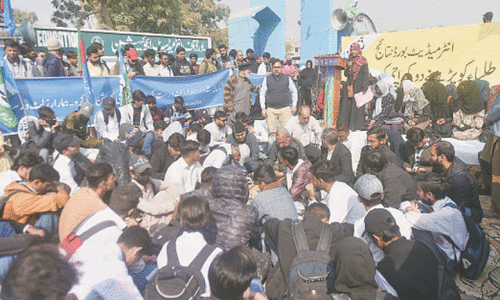• Approves house committee’s recommendations to grant extra marks to first year BIEK students
• Ban imposed on use of plastic bags
• New rules for Sindh Habitual Offenders Monitoring Act approved
KARACHI: The Sindh cabinet on Tuesday ordered a high-level inquiry into irregularities in all educational boards across the province and allowed extra marks to thousands of students who had appeared in first year exam conducted by the Board of Intermediate Education Karachi (BIEK) last year.
The cabinet meeting, chaired by Sindh CM, expressed displeasure over the performance of educational boards in the province and directed the chief secretary to constitute a committee comprising upright officers to conduct inquiry against irregularities in all the educational boards.
A large number of first year students in Karachi, many of whom had secured more than 80-85 per cent marks in matriculation exam, were given less than 50pc marks in the intermediate exams, while several others failed in many subjects.
The poor results in BIEK had triggered protests by the students, political parties and civil rights campaigners and led to the formation of a special committee of the Sindh Assembly to investigate the decline in passing percentage.
The cabinet was informed that a house panel formed a fact-finding committee, led by NED University’s Vice Chancellor Dr Sarosh Lodi, conducted a detailed inquiry and recommended to grant 20pc grace marks in Chemistry and 15pc each in Physics and Mathematics to all students.
A press statement said that the chief minister also directed reforms to improve BIEK operations and prevent such issues in the future.
It said that while the Sindh Boards Ordinance of 1972 did not allow for grace marks, a similar measure was approved by the caretaker chief minister in 2023 based on a previous inquiry.
Ban on plastic shopping bags
The cabinet approved the amended Sindh Prohibition of Non-Degradable Plastic Products Rules, 2014, to potentially ban the manufacturing, sale, and use of all plastic shopping bags in the province, including non-degradable and oxo-degradable types.
The ban will take effect sixty days after the cabinet’s approval.
The cabinet also approved new rules for the Sindh Habitual Offenders Monitoring Act.
The features of the new rules include creation of databases of e-tagged offenders at various police levels. It also says the monitoring devices must be waterproof, durable, non-removable, and capable of real-time tracking. Magistrates will order the attachment of these devices for at least six months, based on police requests or their own initiative.
The law aims to combat street crime and enhance safety in cities. The Act allows for the monitoring of habitual offenders using electronic devices (anklets/bracelets). A “habitual offender” is defined as someone arrested multiple times for specific crimes, including vehicle theft and drug offenses.
Centre for Excellence on Countering Violent Extremism Act
The Sindh Centre for Excellence on Countering Violent Extremism Act, 2025, was presented to the cabinet. It will be established within the home department, led by a board of governors chaired by the home minister.
The Centre’s main functions include conducting research, developing policies to counter violent extremism, and providing support to FATF working groups on terror financing.
The cabinet, upon the request of the investment department, approved the allotment of 10.2 acres of land for the construction of Access Road-2, which would enhance the connectivity of the Dhabeji Special Economic Zone (SEZ) with the National Highway (N-5).
Additionally, the cabinet granted a 99-year lease for the allotment of 3.34 acres in district Malir and district West for the Marble City Access Road, as requested by the investment department.
The cabinet also approved the allotment of 10-12 acres of land to the National Transmission & Dispatch Company (NTDC), Hyderabad, in Taluka and District Matiari for the construction of the Matiari-Lahore Transmission Line Project.
The cabinet also approved the allotment of 5,816 square feet of government land for the construction of the Ram Ashram at Nangarparkar, district Tharparkar, as requested by the Pakistan Hindu Council.
Furthermore, the cabinet allotted 165,415 square feet of government land for the construction of the Ashram of Faqeer Parbrahm in Taluka Diplo, District Tharparkar.
Additionally, government land measuring 12-20 acres surrounding the Churrio Temple at Nagarparkar, district Tharparkar, has also been allotted.
Published in Dawn, April 16th, 2025















































